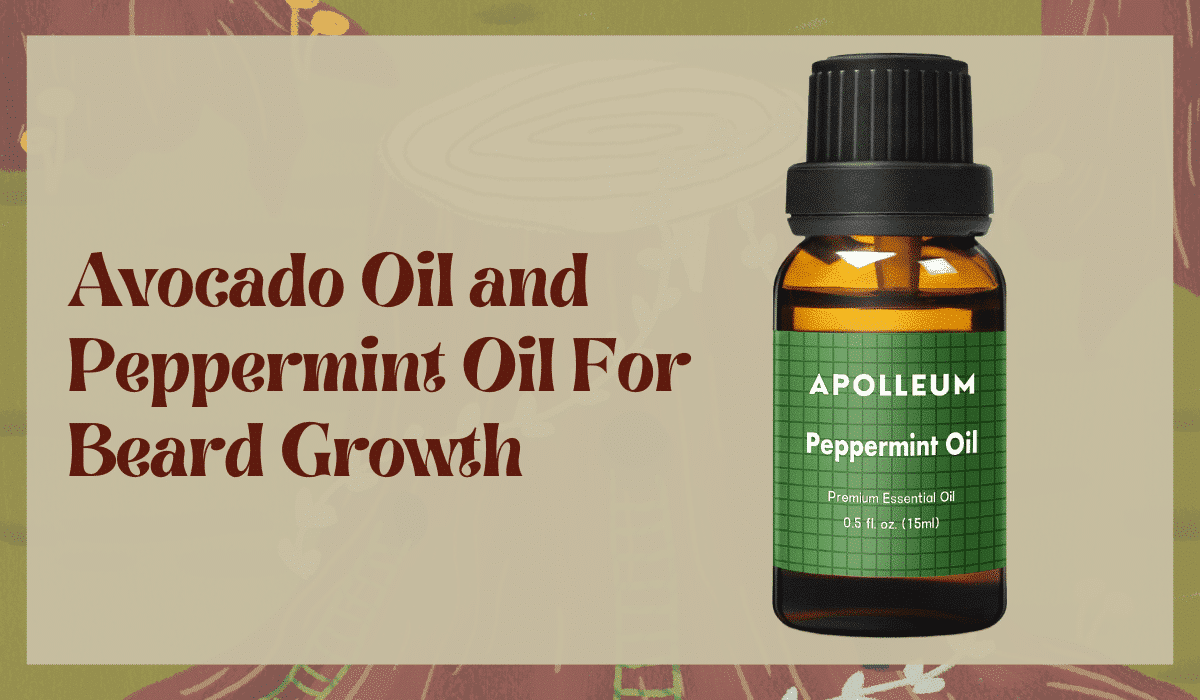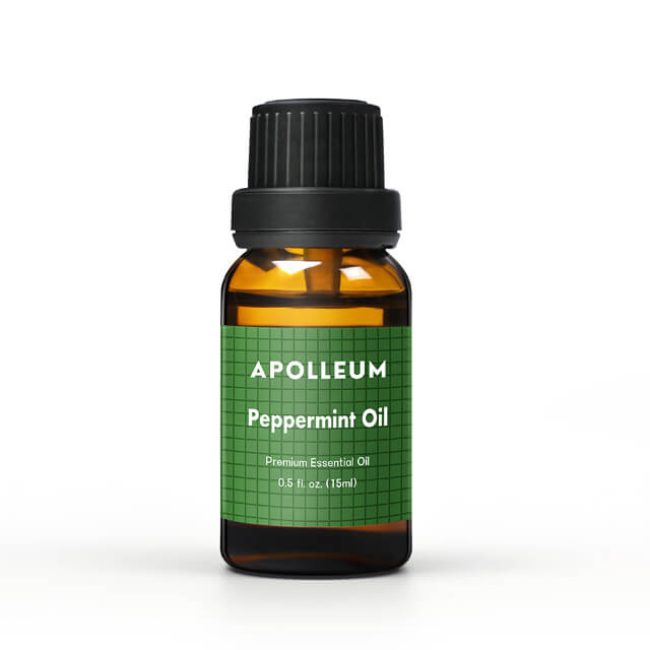
Avocado Oil and Peppermint Oil for beard growth are natural oils used to nourish facial hair and stimulate hair follicles. Avocado oil provides hydration and nutrients, while peppermint oil increases blood circulation to the skin. These oils are important for promoting thicker, healthier beard growth and improving overall beard health.
Avocado Oil and Peppermint Oil For Beard Growth
Table of Contents
Introduction to Beard Growth Challenges
Achieving a full, luscious beard is a goal for many men, embodying masculinity and confidence. The desire for a fuller beard is not just about aesthetics; it’s often tied to self-image and perceived attractiveness. A beard represents maturity and virility, enhancing facial features and framing the face in a way that can significantly boost one’s appeal.
Common Issues Faced by Men
Patchy Beard Growth
One of the most common challenges men face in achieving a full beard is patchy growth. This occurs when hair grows unevenly across the face, leaving noticeable gaps. Patchy beard growth can be frustrating, affecting the overall appearance and making it difficult to style a beard effectively.
Slow Beard Growth
Another prevalent issue is slow beard growth. Many men find that their facial hair grows at a slower rate than desired, delaying the achievement of a full, substantial beard. Factors such as genetics, age, and hormonal balance play crucial roles in beard growth speed.
Itchy or Irritated Skin
When growing a beard, men often experience itchiness or irritation on the skin beneath the facial hair. This discomfort can deter individuals from growing a beard, leading them to abandon their efforts prematurely. Understanding how to prevent itchiness and manage irritation is essential for sustaining beard growth efforts.
Maintenance and Grooming Challenges
Maintaining a well-groomed beard requires effort and consistency. Beard grooming involves trimming, shaping, and conditioning the hair to maintain a neat appearance. Men must invest in quality beard care products and establish a grooming routine that suits their hair type and personal preferences.
Strategies for Overcoming Beard Growth Challenges
Patience and Persistence
Achieving a fuller beard requires patience and persistence. Understanding that beard growth is a gradual process helps men manage expectations and stay committed to their beard growth journey. Regular maintenance and care contribute to healthier hair follicles and improved beard growth over time.
Proper Nutrition and Hydration
A healthy diet rich in vitamins and minerals is essential for supporting hair growth, including facial hair. Foods high in protein, vitamin C, and omega-3 fatty acids promote beard growth and overall hair health. Adequate hydration also plays a crucial role in maintaining healthy skin and facilitating hair growth.
Beard Care Products and Techniques
Choosing the right beard care products and techniques is vital for managing beard growth challenges effectively. Beard oils, balms, and shampoos specifically formulated for facial hair help moisturize the skin, soften the hair, and reduce irritation. Regular trimming and shaping prevent split ends and maintain beard integrity.
Lifestyle Adjustments
Certain lifestyle habits can impact beard growth. Avoiding smoking, managing stress levels, and getting sufficient sleep promote healthy hair growth. Incorporating a regular exercise routine improves circulation, which benefits hair follicles and supports beard growth.
Benefits of Natural Oils
Natural oils have gained significant popularity in recent years as preferred alternatives to synthetic products due to their numerous benefits for skin, hair, and overall health. This article explores why natural oils are favored over synthetic products and provides an introduction to two popular oils: avocado oil and peppermint oil.
Why Natural Oils Are Preferred Over Synthetic Products
Safety and Purity
One of the primary reasons natural oils are preferred over synthetic products is their safety and purity. Natural oils are derived from plants, nuts, or seeds through cold pressing or extraction methods, ensuring they retain their natural nutrients and properties. In contrast, synthetic products often contain artificial additives, fragrances, and chemicals that may cause skin irritation or adverse reactions.
Nutrient-Rich Formulation
Natural oils are rich in essential fatty acids, vitamins, and antioxidants that provide nourishment and protection to the skin and hair. These nutrients help to hydrate, repair, and rejuvenate tissues, promoting healthier skin complexion and stronger hair strands. Avocado oil and peppermint oil, in particular, offer unique benefits due to their specific compositions and properties.
Introduction to Avocado Oil
Avocado oil is extracted from the pulp of ripe avocados and is known for its rich emollient properties. It contains high levels of monounsaturated fats, such as oleic acid, which deeply penetrate the skin to moisturize and soften. Avocado oil is also rich in vitamin E, a powerful antioxidant that helps protect skin cells from damage caused by environmental stressors. Its natural ability to enhance collagen production makes it effective in reducing the appearance of wrinkles and fine lines, promoting a more youthful complexion.
Introduction to Peppermint Oil
Peppermint oil is derived from the leaves and stems of the peppermint plant and is renowned for its cooling and refreshing properties. It contains menthol, which provides a soothing sensation to the skin and scalp, making it a popular ingredient in skincare and hair care products. Peppermint oil has antimicrobial properties that help cleanse and clarify the skin, making it beneficial for acne-prone skin types. When used in hair care, it stimulates the scalp, promoting circulation and healthy hair growth while imparting a pleasant, invigorating aroma.
Properties of Avocado Oil
Avocado oil is celebrated for its exceptional richness in vitamins and nutrients, offering extensive benefits for skin and hair care. This article explores the properties of avocado oil, emphasizing its moisturizing and conditioning capabilities.
Rich in Vitamins and Nutrients
Avocado oil is packed with essential vitamins and nutrients that contribute to its potent skincare benefits. It is notably high in:
Vitamin E: A powerful antioxidant that helps protect skin cells from damage caused by free radicals and environmental stressors. Vitamin E also supports skin repair and rejuvenation, promoting a youthful appearance.
Vitamin C: Known for its brightening effects on the skin, vitamin C in avocado oil helps to even out skin tone and reduce the appearance of dark spots and hyperpigmentation.
Omega-3 Fatty Acids: These essential fatty acids nourish and strengthen the skin’s lipid barrier, enhancing moisture retention and improving elasticity.
Moisturizing and Conditioning Benefits
Avocado oil is renowned for its deep moisturizing and conditioning properties, making it a popular choice in skincare products. Here’s how avocado oil benefits both skin and hair:
Skincare Benefits
Intense Hydration: Avocado oil penetrates deeply into the skin, providing long-lasting moisture without leaving a greasy residue. It helps to soothe dry, flaky skin and restore its natural suppleness.
Skin Barrier Repair: The combination of vitamins and fatty acids in avocado oil strengthens the skin’s barrier function, preventing moisture loss and protecting against environmental aggressors.
Anti-Aging Properties: By promoting collagen production and reducing oxidative stress, avocado oil helps to diminish the appearance of fine lines and wrinkles, promoting a smoother, more youthful complexion.
Hair Care Benefits
Deep Conditioning: Avocado oil nourishes and moisturizes the hair shaft, improving manageability and reducing frizz. It enhances hair elasticity, making it less prone to breakage and split ends.
Scalp Health: Massaging avocado oil into the scalp stimulates circulation and helps maintain a healthy scalp environment. It can alleviate dryness, itchiness, and dandruff, promoting overall hair health and growth.
Properties of Peppermint Oil
Peppermint oil is renowned for its invigorating properties and versatile applications in skincare and hair care. This article delves into the distinctive properties of peppermint oil, highlighting its cooling effects on the skin and its ability to stimulate hair follicles for growth.
Cooling and Refreshing Effects on the Skin
Peppermint oil is celebrated for its refreshing and cooling sensations when applied to the skin. This is primarily due to its high menthol content, which provides a soothing and invigorating experience. Here are the key benefits for skincare:
Soothing Irritation: Peppermint oil has natural analgesic and anti-inflammatory properties that help alleviate itching, redness, and irritation on the skin. It provides instant relief to discomfort caused by insect bites, rashes, or minor burns.
Balancing Oil Production: The cooling effect of peppermint oil helps regulate sebum production in oily skin types, reducing excessive shine and promoting a more balanced complexion.
Improving Skin Tone: Regular use of peppermint oil can help brighten dull skin and promote a clearer, more radiant complexion. Its stimulating properties enhance circulation, leading to healthier-looking skin.
Stimulating Hair Follicles for Growth
Peppermint oil is widely recognized for its ability to stimulate hair follicles and promote hair growth. When applied to the scalp, it delivers several benefits to hair health:
Increased Blood Circulation: The menthol in peppermint oil stimulates blood flow to the hair follicles, promoting nutrient delivery and oxygen supply. This enhances the follicles’ activity and encourages healthy hair growth.
Strengthens Hair Roots: Peppermint oil strengthens the hair roots and reduces hair loss by improving follicle depth and structural integrity. It helps prevent premature hair shedding and supports thicker, fuller hair over time.
Cooling Scalp Sensation: Apart from promoting growth, peppermint oil’s cooling sensation provides relief from scalp itchiness, dryness, and discomfort. It leaves the scalp feeling refreshed and rejuvenated after each application.
Combining Avocado Oil and Peppermint Oil
Combining avocado oil and peppermint oil offers synergistic benefits for beard health, providing nourishment, hydration, and promoting growth. This article explores the advantages of using these oils together and offers guidance on creating a blend for optimal results.
Synergistic Benefits for Beard Health
Nourishment and Moisture
Avocado Oil: Rich in vitamins and essential fatty acids, avocado oil deeply nourishes the beard and underlying skin. It moisturizes dry, brittle hair, making it more manageable and less prone to breakage.
Peppermint Oil: Known for its cooling and refreshing properties, peppermint oil soothes the skin and provides a tingling sensation. It helps balance oil production on the skin’s surface, preventing clogged pores and promoting a healthier beard growth environment.
Stimulated Growth
Avocado Oil: Supports beard growth by moisturizing the follicles and promoting circulation to the hair roots. It strengthens the hair shaft and reduces hair loss, resulting in a fuller, thicker beard over time.
Peppermint Oil: Stimulates blood flow to the hair follicles, enhancing nutrient delivery and oxygen supply. This promotes faster and healthier beard growth while imparting a fresh, invigorating scent.
Skin Health
Avocado Oil: Improves the overall health of the skin beneath the beard by protecting against oxidative damage and promoting collagen production. It helps maintain a smooth, supple complexion.
Peppermint Oil: Relieves itchiness and irritation commonly associated with beard growth. Its anti-inflammatory properties calm sensitive skin and prevent discomfort.
How to Create a Blend for Optimal Results
Creating a blend of avocado oil and peppermint oil is simple and effective. Here’s a basic recipe:
Ingredients:
- 1 tablespoon of avocado oil
- 3-5 drops of peppermint oil
Instructions:
- Combine the avocado oil and peppermint oil in a small, dark-colored glass bottle.
- Gently shake the bottle to mix the oils thoroughly.
Application:
- After cleansing your face and beard, apply a few drops of the oil blend to your palms.
- Massage the oil into your beard and skin, ensuring even distribution.
- Use daily as part of your beard care routine, focusing on areas where growth or hydration is needed most.
Storage:
- Store the oil blend in a cool, dark place to preserve its potency and freshness.
- Avoid exposure to direct sunlight or heat, which can degrade the oils’ beneficial properties.
Application Techniques
Proper application techniques are crucial for maximizing the benefits of oils such as avocado oil and peppermint oil on your beard. This article explores the correct ways to apply oils to the beard and effective massaging techniques for optimal absorption.
Proper Ways to Apply Oils to the Beard
Cleanse and Prepare
Before applying any oil to your beard, it’s essential to cleanse it thoroughly with a gentle beard shampoo or cleanser. This removes dirt, excess oils, and product buildup, allowing the oils to penetrate the hair and skin effectively.
Use a Dropper or Dispenser
To avoid wastage and ensure precise application, use a dropper or dispenser when dispensing oils onto your palms. This allows you to control the amount of oil used and prevents spillage.
Even Distribution
Rub the oil between your palms to warm it up slightly, then apply it evenly throughout your beard. Start from the roots and work your way to the tips of the hair follicles. Ensure that every part of your beard receives adequate coverage.
Comb Through
After applying the oil, use a beard comb or brush to distribute it evenly and detangle any knots or snags. This helps coat each hair strand with the oil and ensures uniform absorption.
Massaging Techniques for Absorption
Circular Motion
Using your fingertips, gently massage the oil into your beard and skin using small, circular motions. This stimulates blood circulation to the hair follicles and promotes better absorption of the oils.
Focus on the Skin
While massaging, focus on the skin beneath your beard as well. This helps nourish the hair follicles and promotes healthier growth from the root.
Be Gentle
Avoid applying too much pressure during the massage to prevent pulling or tugging on the hair. A gentle touch is sufficient to encourage absorption without causing discomfort.
Duration
Massage the oil into your beard and skin for at least 1-2 minutes to ensure thorough absorption. This allows the oils to penetrate deeply and deliver their beneficial nutrients.
Scientific Evidence and Research
Scientific studies provide valuable insights into the benefits of avocado oil and peppermint oil for various aspects of health and skincare. This article delves into the research supporting the use of avocado oil and peppermint oil, highlighting their proven effectiveness.
Studies Supporting the Use of Avocado Oil
Skin Benefits
Moisturizing Properties: A study published in the Journal of Cosmetic Dermatology found that avocado oil is rich in monounsaturated fatty acids and sterols, which effectively moisturize and nourish the skin. It helps to improve skin elasticity and hydration levels, making it an excellent choice for dry or mature skin.
Wound Healing: Research published in the International Wound Journal suggests that avocado oil promotes faster wound healing due to its ability to stimulate collagen synthesis and reduce inflammation. Its antioxidant properties also protect skin cells from oxidative damage.
Anti-Inflammatory Effects: According to a study in Evidence-Based Complementary and Alternative Medicine, avocado oil exhibits potent anti-inflammatory effects, making it beneficial for conditions such as eczema and psoriasis. It soothes irritated skin and reduces redness effectively.
Studies Supporting the Use of Peppermint Oil
Hair and Scalp Benefits
Hair Growth Stimulation: A study published in the Journal of Toxicological Sciences demonstrated that peppermint oil enhances hair growth by increasing dermal thickness, follicle number, and follicle depth. Its menthol content stimulates blood circulation to the scalp, promoting nutrient delivery to hair follicles.
Antimicrobial Properties: Research in the European Journal of Medical Research highlights peppermint oil’s antimicrobial properties, which help combat scalp conditions like dandruff and scalp acne. It effectively cleanses the scalp and maintains a healthy environment for hair growth.
Cooling Sensation: Studies indicate that the cooling sensation provided by peppermint oil not only refreshes the scalp but also alleviates itching and discomfort associated with various scalp conditions. This makes it a popular choice in hair care products for its soothing effects.
Side Effects and Precautions
Avocado oil and peppermint oil, while beneficial, may pose potential side effects and require precautions to ensure safe usage. This article explores common concerns such as allergies, sensitivities, and the importance of patch testing before regular use.
Potential Allergies and Sensitivities
Avocado Oil
Latex Allergy: Individuals with latex allergies may be sensitive to avocado oil due to cross-reactivity. Avocado contains proteins similar to those found in latex, which can trigger allergic reactions in susceptible individuals.
Skin Sensitivity: Some people may experience skin irritation, redness, or itching when using avocado oil, especially if they have sensitive skin or are prone to allergies. It’s advisable to perform a patch test before applying avocado oil generously to ensure compatibility.
Peppermint Oil
Skin Irritation: Peppermint oil is highly concentrated and can cause skin irritation or allergic reactions in some individuals. It is recommended to dilute peppermint oil with a carrier oil before applying it to the skin, especially for those with sensitive skin.
Mucous Membrane Sensitivity: Direct application of undiluted peppermint oil to mucous membranes (such as the eyes, nose, or mouth) can cause irritation, burning sensation, or allergic reactions. Use caution and avoid contact with sensitive areas.
Patch Testing Before Regular Use
How to Perform a Patch Test
Dilute the Oil: Mix a small amount of avocado oil or peppermint oil with a carrier oil such as coconut oil or jojoba oil. The carrier oil helps reduce the concentration of the essential oil and minimizes the risk of irritation.
Apply to a Small Area: Dab a small amount of the diluted oil mixture onto a clean patch of skin on your forearm or behind your ear.
Wait and Observe: Allow the patch test area to air dry and leave it uncovered for 24-48 hours. Monitor for any signs of redness, itching, swelling, or irritation.
Evaluate Results: If you experience any adverse reactions during the patch test, discontinue use of the oil. If there are no reactions, it is likely safe to use the oil as directed.
Choosing Quality Oils
Selecting pure and organic oils is crucial for ensuring effectiveness and safety in skincare and hair care routines. This article provides guidelines on how to identify high-quality oils and offers recommendations for trusted brands and products.
How to Identify Pure and Organic Oils
Look for Certifications
Organic Certification: Choose oils that are certified organic by reputable organizations such as USDA Organic or EcoCert. Organic certification ensures that the oils are free from synthetic pesticides, herbicides, and other harmful chemicals.
Cold-Pressed or Steam-Distilled: Opt for oils that are cold-pressed or steam-distilled. These extraction methods preserve the natural nutrients, vitamins, and beneficial compounds of the oils without the use of heat or chemicals.
Check Ingredients and Labels
Ingredients List: Read the ingredients list carefully. Pure oils should contain only one ingredient: the oil itself. Avoid products that list additives, fillers, or synthetic fragrances.
Packaging: Quality oils are typically packaged in dark glass bottles to protect them from light and preserve their freshness. Avoid oils packaged in clear or plastic containers, as they may degrade over time.
Sourcing and Transparency
Source of Origin: Look for information on where the oils are sourced from. Oils sourced from regions known for their high-quality botanicals often yield superior oils.
Transparency: Choose brands that provide transparent information about their sourcing, extraction methods, and testing procedures. This transparency ensures accountability and product quality.
Recommended Brands and Products
Avocado Oil
Now Foods Avocado Oil: Known for its high-quality, cold-pressed avocado oil that is rich in vitamins and suitable for both skincare and culinary uses.
Sky Organics Avocado Oil: Certified organic and cold-pressed, Sky Organics offers a pure avocado oil that is ideal for moisturizing skin and hair.
Peppermint Oil
Healing Solutions Peppermint Essential Oil: This brand offers 100% pure, steam-distilled peppermint oil with a refreshing aroma and therapeutic benefits for hair and scalp health.
Plant Therapy Peppermint Essential Oil: Known for its high-quality essential oils, Plant Therapy provides USDA Organic certified peppermint oil that is safe and effective for various uses.
Conclusion
In conclusion, incorporating avocado oil and peppermint oil into your skincare and hair care routines can offer a multitude of benefits backed by scientific research and practical applications. Avocado oil provides deep hydration, promotes skin elasticity, and aids in wound healing, making it an excellent choice for dry or damaged skin. Peppermint oil, with its cooling sensation and hair growth stimulation properties, rejuvenates the scalp and enhances hair health.
FAQs
Does peppermint and avocado oil help with beard growth?
Yes, peppermint oil can stimulate hair growth due to its menthol content, which increases blood circulation. Avocado oil is rich in nutrients that nourish hair follicles. Combining both can support beard growth.
Can you mix avocado oil and peppermint oil for hair growth?
Yes, you can mix avocado oil and peppermint oil for hair growth. Avocado oil acts as a carrier oil that dilutes the peppermint oil, making it safe to apply to the skin and hair.
Does avocado increase beard growth?
Avocado oil provides nutrients that nourish hair follicles, which may indirectly support beard growth, but there is no direct evidence that avocado oil specifically increases beard growth.
How long does it take peppermint oil to grow facial hair?
Results vary, but some studies suggest that noticeable improvements in hair growth can occur within a few weeks to a few months of regular use.
Which oil grows beard fastest?
There is no definitive answer, but oils like castor oil, peppermint oil, and rosemary oil are commonly cited for promoting faster beard growth due to their stimulating and nourishing properties.
How much avocado oil should I mix with peppermint oil?
A common ratio is to mix 1-2 drops of peppermint oil with 1 tablespoon of avocado oil. This ensures the peppermint oil is adequately diluted to prevent skin irritation.
What are the disadvantages of avocado oil on skin?
While generally safe, some disadvantages include potential allergic reactions, clogged pores for those with acne-prone skin, and a greasy feeling if too much is applied.
What happens if you put too much peppermint oil in your hair?
Using too much peppermint oil can cause scalp irritation, burning sensations, and even dizziness due to its strong menthol content. Always dilute peppermint oil properly before use.
What does avocado oil do for your face?
Avocado oil moisturizes and nourishes the skin, helps reduce inflammation, and may improve skin elasticity and texture. It’s rich in antioxidants and vitamins A, D, and E.
What grows your beard the fastest?
Genetics play a major role, but maintaining a healthy diet, proper skincare, regular exercise, and using beard growth-promoting oils like castor, peppermint, and rosemary oil can help.
How can I stimulate my beard growth?
Stimulate beard growth by maintaining a healthy diet, exercising regularly, ensuring proper sleep, keeping your skin clean and exfoliated, and using growth-promoting oils.
What stunts beard growth?
Factors that can stunt beard growth include poor diet, stress, lack of sleep, hormonal imbalances, and improper skincare.
Is peppermint oil better than minoxidil for beard growth?
Peppermint oil can stimulate hair growth, but minoxidil is a clinically proven treatment for hair growth. The effectiveness of peppermint oil compared to minoxidil may vary between individuals.
How much peppermint oil to add to beard oil?
Add 1-2 drops of peppermint oil per tablespoon of beard oil to ensure it’s properly diluted and safe for use on the skin.
What percentage of peppermint oil for hair growth?
A safe and effective percentage is around 3-5% peppermint oil diluted in a carrier oil like avocado or jojoba oil.
Does avocado oil grow a beard?
While avocado oil nourishes and conditions the skin and hair, there is no direct evidence that it specifically promotes beard growth.
Is peppermint oil good for beard growth?
Yes, peppermint oil is good for beard growth as it stimulates blood circulation and promotes hair follicle health, potentially leading to increased beard growth.
What is the best oil combination for beard?
A good combination for beard growth includes jojoba oil, argan oil, and a few drops of essential oils like peppermint, rosemary, and tea tree oil.
Do avocado oil and peppermint oil work for hair growth?
Yes, avocado oil and peppermint oil can work together for hair growth by providing nourishment and stimulation to hair follicles.
Does avocado oil stimulate hair growth?
Avocado oil nourishes hair follicles and can support healthy hair growth due to its rich nutrient content, though it may not directly stimulate growth.
Does peppermint stimulate hair growth?
Yes, peppermint oil can stimulate hair growth by increasing blood flow to the scalp and hair follicles.
Can I leave avocado oil on my face all day?
Yes, you can leave avocado oil on your face all day, but if you have oily or acne-prone skin, it’s best to monitor how your skin reacts and possibly rinse it off after a few hours.
Who should avoid avocado oil?
Individuals with avocado allergies or those with very sensitive skin prone to breakouts should avoid using avocado oil.
Does avocado oil clog pores on face?
Avocado oil is considered moderately comedogenic, meaning it can clog pores in some individuals, particularly those with acne-prone skin.
What is the number one beard growth oil?
Castor oil is often cited as the number one beard growth oil due to its high ricinoleic acid content, which promotes hair growth.
Which oils are best for beard growth?
Oils best for beard growth include castor oil, jojoba oil, argan oil, and essential oils like peppermint, rosemary, and tea tree oil.
What is a good substitute for minoxidil for beard growth?
Natural substitutes for minoxidil include essential oils like peppermint oil, rosemary oil, and blends like castor oil, which are known to promote hair growth.
How do you make 3% peppermint oil for beard growth?
To make a 3% solution, mix 3 drops of peppermint oil with 97 drops of a carrier oil like jojoba or avocado oil.
Is peppermint a DHT blocker?
Peppermint oil is not typically classified as a DHT blocker. DHT blockers are substances that inhibit the production of dihydrotestosterone, a hormone linked to hair loss.
What happens if you leave peppermint oil in your hair?
Leaving peppermint oil in your hair without proper dilution can cause scalp irritation and discomfort. Always dilute peppermint oil with a carrier oil before application.
How to mix avocado and peppermint oil for beard growth?
Mix 1-2 drops of peppermint oil with 1 tablespoon of avocado oil. Apply this mixture to your beard and massage it into the skin.
Can you mix avocado oil and peppermint oil for hair growth?
Yes, you can mix avocado oil and peppermint oil for hair growth. The avocado oil serves as a nourishing carrier oil that dilutes the peppermint oil.
What are the side effects of peppermint oil on hair?
Side effects of peppermint oil on hair can include scalp irritation, redness, and a burning sensation if not properly diluted.
Does avocado oil cause facial hair growth?
Avocado oil provides nutrients that can support overall hair health, but there is no direct evidence that it specifically causes facial hair growth.
Can I use avocado oil on my face everyday?
Yes, you can use avocado oil on your face every day, provided it does not cause irritation or clog your pores.
Can I sleep with avocado oil on my face?
Yes, you can sleep with avocado oil on your face. It can provide overnight hydration and nourishment to your skin.
What oil makes beard thicker?
Castor oil is known to make beards thicker due to its high ricinoleic acid content, which promotes hair growth and strengthens hair strands.
What promotes beard growth?
Healthy diet, regular exercise, proper sleep, good skincare, and the use of growth-promoting oils like castor, peppermint, and rosemary oil can promote beard growth.
How to grow a beard quickly?
To grow a beard quickly, maintain a healthy lifestyle, use beard growth oils, keep your skin clean and exfoliated, and ensure adequate sleep and hydration.
Does peppermint oil make beard thicker?
Peppermint oil can make the beard appear thicker by stimulating blood flow to hair follicles and promoting healthy hair growth.
Is rosemary or peppermint oil good for beard growth?
Both rosemary and peppermint oil are good for beard growth. They stimulate blood circulation and promote hair follicle health.
What is the best essential oil for beard growth?
Peppermint oil, rosemary oil, and tea tree oil are among the best essential oils for beard growth due to their stimulating and nourishing properties.
How much avocado oil should I mix with peppermint oil?
Mix 1-2 drops of peppermint oil with 1 tablespoon of avocado oil for a safe and effective beard growth blend.
Is peppermint oil better than minoxidil?
Peppermint oil can stimulate hair growth, but minoxidil is a clinically proven treatment for hair growth. The effectiveness varies among individuals.
Does peppermint oil really grow hair?
Yes, peppermint oil can promote hair growth by increasing blood circulation to the scalp and stimulating hair follicles.
Latest Products
-
Truck Wireless Monitor K8
$130.00Original price was: $130.00.$95.00Current price is: $95.00. Add to cart -
M2 Pro Motorcycle CarPlay
$180.00Original price was: $180.00.$120.00Current price is: $120.00. Add to cart -
Car 5inch IP67 Motorcycle Carplay
$76.00Original price was: $76.00.$55.00Current price is: $55.00. Add to cart -
6.25 Inch Motorcycle DVR
$130.00Original price was: $130.00.$110.00Current price is: $110.00. Add to cart





